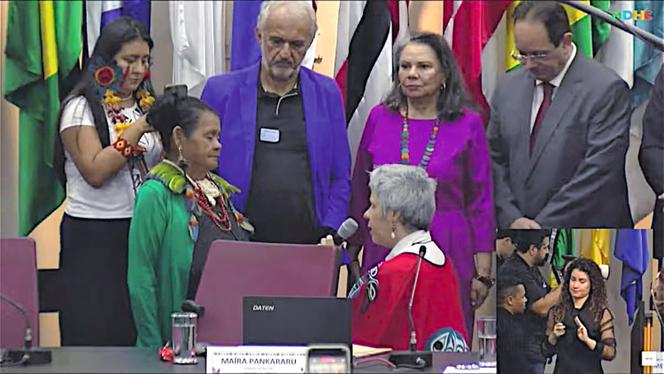


The moment was historic, and Eneá de Stutz e Almeida understood it well. On April 2, in Brasilia, the President of the Amnesty Commission, responsible for reparation policies for victims of the military dictatorship, suddenly dropped to her knees. Standing opposite her, wearing a green vest and feathered necklace, was Djanira Krenak, one of the figureheads of the indigenous movement, leader, and matriarch of the Krenak people. "With your blessing, in the name of the Brazilian state, I want to ask forgiveness for all the suffering endured by your people," said Almeida, moved and solemn. "I ask forgiveness for the persecution suffered by your people and all other indigenous peoples over the last 524 years," she said.
In the assembly, indigenous representatives were present in large numbers, dressed in cocars, traditional feathered headdresses, and their bodies smeared with dark paint made from jenipapo fruit. Several representatives of the Ministry of Human Rights, to which the commission is attached, were also present. No one wanted to miss this moment: the very first official apology by the Brazilian state to indigenous peoples for crimes committed since the beginning of colonization.
This unprecedented and symbolic act, in a Brazil where indigenous populations are said to have plummeted by 99% following the arrival of Europeans, is the result of a collective effort led by two peoples: the Krenak, originating from the state of Minas Gerais (southeast), and the Guarani-Kaiowá, from Mato Grosso do Sul (central-west). Both groups endured horrifying violence, torture, and forced displacement during the military regime (1964-1985). "April 2, 2024, will be remembered as an extremely significant day, showing the world that despite all the suffering they have endured, indigenous peoples are resisting and standing firm," said Shirley Krenak, another leading figure of the Krenak people.
The case of the Krenak is particularly shocking. This community living on the banks of the Rio Doce was one of the targets of the junta's repression, forced to leave their ancestral lands and re-educated in houses of correction, nicknamed by many as indigenous concentration camps. Dozens, if not hundreds, of Krenak were subjected to abuse, forced labor, and forbidden to speak their native languages. Some were forcibly conscripted into a sinister militia known as the Rural Indigenous Guard (GRIN), trained in torture techniques and to hunt for political opponents. "A regime of terror prevailed in these prisons," said anthropologist Pedro Pablo Fermín Maguire in 2022, in his thesis on the subject.
You have 46.83% of this article left to read. The rest is for subscribers only.
